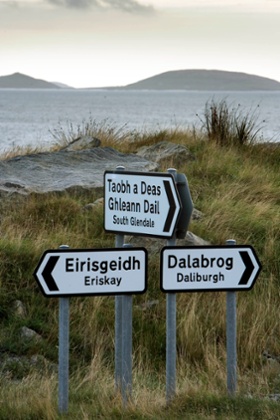Mind your Language (The Guardian), 3-10-2014
Irrespective of the political fallout from the independence referendum, the UK’s language patchwork is stronger having retained the rich tradition of Scots English
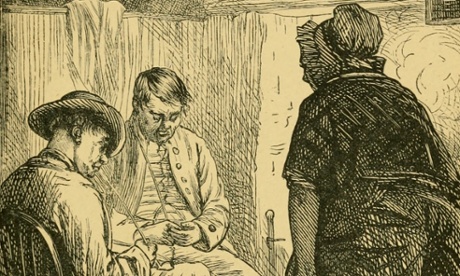
There is an old Scottish joke, no doubt baffling to the majority of English speakers, that goes something like this: what do you call a pigeon that goes to Aviemore for its holidays? A skean dhu.
If you’re not laughing, don’t feel too bad, as the joke neatly illustrates how comprehension of language is intrinsically linked with considerations of geography, pronunciation and dialect. Throw in a punchline that borrows from Scottish Gaelic, and the joke becomes incomprehensible to all but most Scots.
To decipher it, you need to know three things: that Aviemore is Scotland’s most popular skiing resort; that the Gaelic skean dhu, which is the ceremonial dagger worn in your sock if you’re in full Highland dress (it means, literally, black dagger), is pronounced similar to “skiing doo”; and that the word dhu/doo is regional slang for a dove or pigeon. OK, the joke won’t win any prizes, but I’ve had worse from Christmas crackers.
A note about the terminology. Scots English, used predominantly in the Lowlands and populous central belt of Scotland, is a dialect of English. Though it has its own dictionary, it is not a language in its own right, unlike Scottish Gaelic. It’s also worth mentioning that Scottish Gaelic is pronounced something like GAH-lick, rather than the common GAY-lick pronunciation of its Irish linguistic cousin.
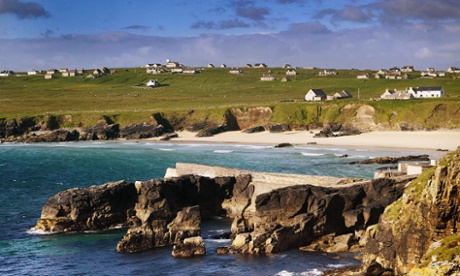
Scots has its own esteemed body of literature, most notably the poems of Robert Burns, and is peppered with words that leave most other English speakers scratching their heids (another Scots dialectal form): shuggle for shake, niffle-naffle for wasting time, the exuberantly satisfying gontrum niddles for a cry of joy, and countless others. Swithering, for hesitating, may have become more familiar during the independence referendum campaign as applied, not entirely flatteringly, to undecided voters.
I have something of a fascination with Scots English, and particularly the influence of Scottish Gaelic upon it. Though I am Cheshire-born and raised, my dad is from Inverness in the Scottish Highlands; my grandparents grew up in the community of Ness on Lewis – the northernmost of the Western Isles, now officially known by their Gaelic name, Eilean Siar.
During our family’s regular visits up to Inverness (the amenities on offer at every service station on the M6, M74 and A9 remain burned in my mind) I remember sitting quietly outside the kitchen door just listening to my grandparents talk. Their native tongue was all rolling, melodic vowels and exotic, throaty consonants. I was engrossed. If they caught me lurking, Granny would pinch my cheek and call me garai (darling). At family weddings when shennair (Grandad) made slightly ponderous speeches, I had to remind myself to give him a break, as English was not his first language.
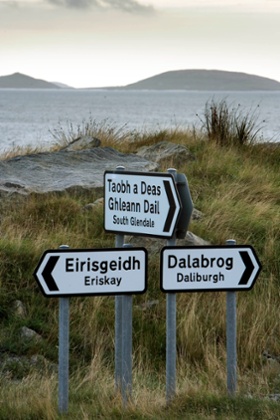
Gaelic remains the first language of many people in the Hebrides, and the more remote parts of the coastal Highlands. My aunt, from the island of North Uist, spoke Gaelic exclusively at home with her five sisters and two brothers, and was only forced to speak English when starting school aged five. Though now the matriarch of a growing English-speaking family, she still admits to thinking – and very occasionally swearing – in Gaelic. The word donas, which equates to little devil or imp, was a particular favourite.
What had never occurred to me, until I thought to ask my aunt about it, was that many of these generations of Gaelic speakers never learned to read or write in the language – or even stick to consistent spellings, which is why you’ll often find three or four different versions of a given name depending on which part of the Highlands or islands you are concerned with. For example, the Gaelic equivalent of Kirsty can be variously spelled Ciorstaidh, Ciorstag or, closest to its pronunciation (to English eyes), Curstag.
Written Gaelic is, however, undergoing something of a revival – at least in metropolitan areas. In 2005, the Scottish parliament passed the Gaelic Language (Scotland) Act, seeking to secure Gaelic’s status as an official language of Scotland, equal with English. The number of pupils beginning their primary education in Gaelic has risen by 13% in the past year, according to the latest figures. But the language continues to struggle in rural areas and the Western Isles, mirroring the population decline as young people leave their communities for jobs in the cities.
As Bill Bryson notes in Mother Tongue, his examination of modern English usage, speakers of Scots, particularly in the Highlands, have developed certain speech patterns clearly influenced by Gaelic phrasings, saying “take that here” rather than “bring that here” and “I’m seeing you” in preference to “I see you”. And many Gaelic words have become accepted part of Scots vocabulary: slàinte, ceilidh, bothy, caber.
These words – and the many others not of Gaelic origin that make up the bulk of Scots vocabulary – enrich the language inordinately. In chip shops, for example, who can deny that adding the word supper is a far classier way to say “and chips”? That “red pudding” is a more appetising prospect than sausage in batter? (Just remember to say you want a carryout, and not a takeaway, unless you want to sound like a sassenach (see below).
A few more of my favourite Scots words and expressions follow. Feel free to add your own in the comments below. And slàinte!
Some examples of Scots English – and their translations
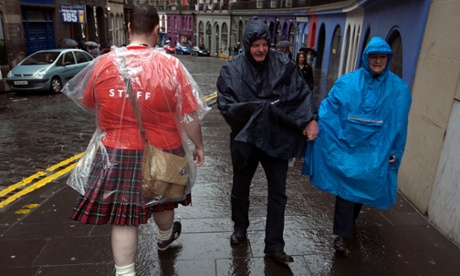
Drouthy
Thirsty, although more along the lines of wanting a strong drink. In the Burns poem Tam o’ Shanter, the drouthy neibors (neighbours) may well be alcoholic.
Sassenach
Derogatory Highlands word for a Lowland Scot or English person.
Teuchter
What a Lowland Scot might term a Highlander after being called a sassenach.
Dreich
If at least three of the following types of weather are happening simultaneously, it’s dreich: overcast, wet, cold, misty, gloomy. Was last year voted Scots’ favourite word.
Blether
What my aunt does on the phone to her sisters. Gossip, talk at length without pause.
Wheesht!
What you might say to someone who is blethering too much; Shush!
